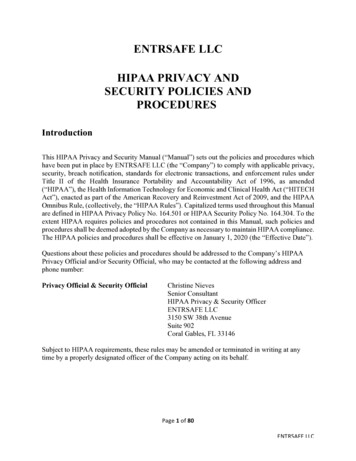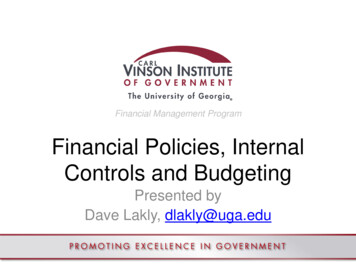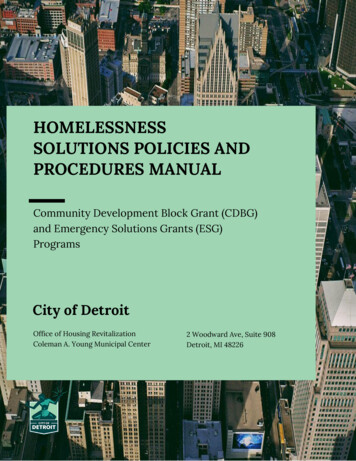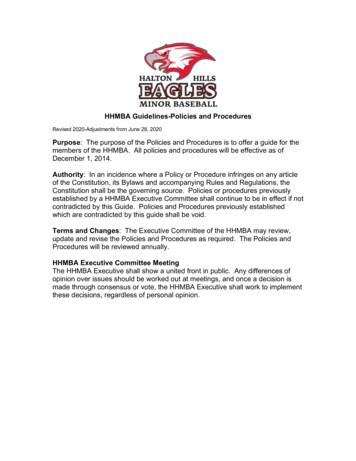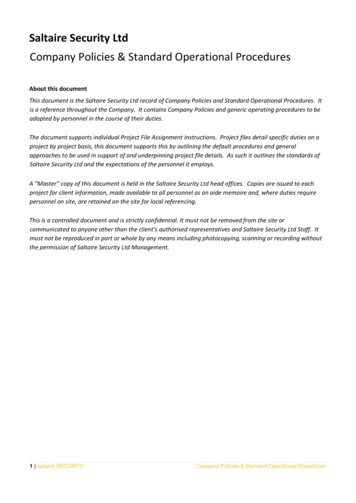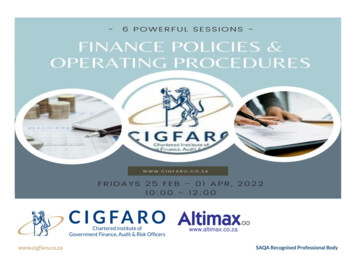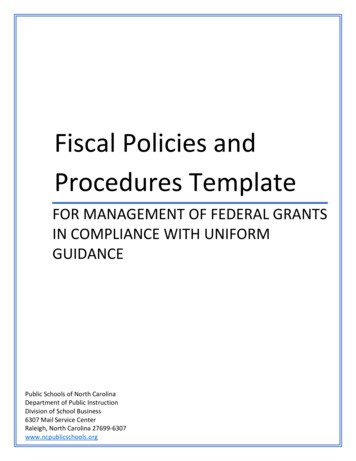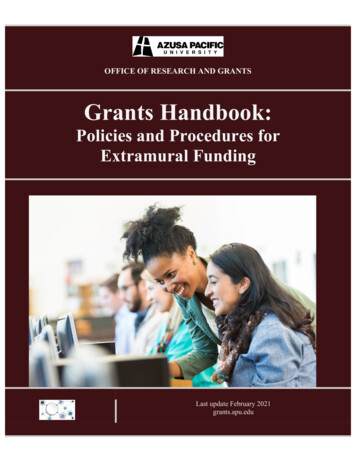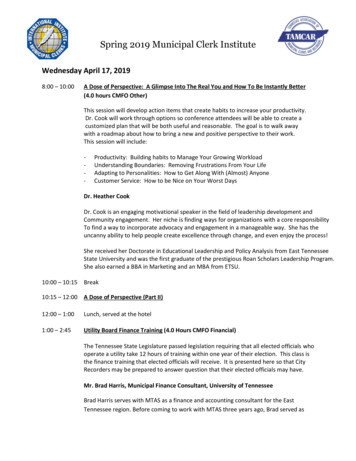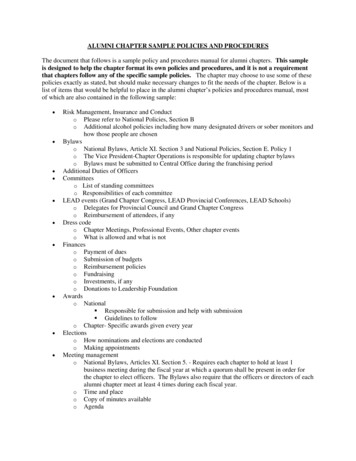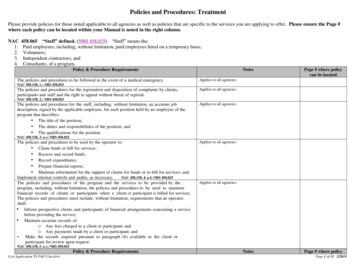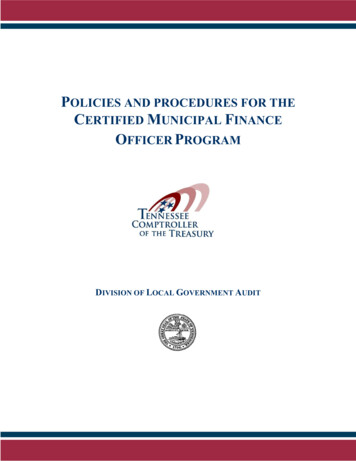
Transcription
POLICIES AND PROCEDURES FOR THECERTIFIED MUNICIPAL FINANCEOFFICER PROGRAMDIVISION OF LOCAL GOVERNMENT AUDIT
CERTIFIED MUNICIPAL FINANCE OFFICER PROGRAMPOLICIES AND PROCEDURES MANUALSTATE OF TENNESSEECOMPTROLLER OF THE TREASURYDIVISION OF LOCAL GOVERNMENT AUDITJULY 2022 REVISION2
Summary Guide for the Certified Municipal Finance Officer programAn individual desiring to become a Certified Municipal Finance Officer (CMFO) must complete theMunicipal Technical Advisory Service (MTAS) approved program. A candidate need not be employedby a municipality in order to obtain the certification. MTAS has developed methods for candidates toenroll in the program, complete the required courses, and take the examination. Before starting theCMFO program, you will need to follow the steps below:Step 1All candidates must first apply for an account in the Certified Municipal Finance tep 2Upon approval of the CMFOAS account by the Comptroller’s Office, a confirmation emailwill be sent to the candidate. The CMFOAS account will be used to apply for the CMFOcertificate upon completion of the program and to maintain Continuing ProfessionalEducation (CPE) documentation.Step 3The CMFO candidate is required to attend classes offered by MTAS for the CMFOprogram. You must contact MTAS for information regarding location and dates ofavailable CMFO program classes.Step 4The CMFO candidate must successfully pass an exam following each of the 10 courses inthe CMFO program.Step 5Eligible candidates should submit a “Reimbursement of Certification Expenses Form”through their account in the CMFOAS (found on the Comptroller’s website) to requestreimbursement of costs associated with participation in the CMFO program. Eligibleexpenses include travel-related expenditures and fees associated with the CMFO classes.Reimbursement forms should be submitted within 60 days of completion of each course tothe Comptroller’s Office for processing.Step 6Upon successful completion of all courses, a CMFO candidate must log into their accountin the CMFOAS to complete an application for a CMFO certificate. A copy of yourtranscript from MTAS is also required to be uploaded into your state account forconfirmation of completing all 10 courses.Step 7Eligible individuals who successfully complete the CMFO program may receive a onetime stipend of 1,000. Upon completion of the program, the successful candidate shouldcomplete a “Stipend Authorization Form” through their account in the CMFOAS andsubmit the form to the Comptroller’s Office for payment.Summary Guide for Continuing Professional Education (CPE) only CitiesAny municipality with five hundred thousand dollars ( 500,000) or less in gross revenues for all funds,including utilities, but excluding one-time non-recurring grants, and with debt totaling five hundredthousand dollars ( 500,000) or less in the immediately preceding fiscal year may, instead of employinga CMFO or a qualified individual who is exempt from CMFO certification (e.g. CPA, CGFM, or3
CPFO) for financial oversight, have in their employment an individual who has met the continuingeducation requirements of T.C.A. § 6-56-404. The individual must follow the steps below:Step 1Apply for an account in our Certified Municipal Finance Officer Act System (CMFOAS)on the Comptroller’s Website. p 2Upon approval of the CMFOAS account by the Comptroller’s office, a confirmation emailwill be sent to the individual. The CMFOAS account will be used to maintain CPEdocumentation.Step 3The individual, upon confirmation of their account, will return to the CMFOA System tocomplete an application for CPE only municipalities on the main menu. The applicationmust be completed before the individual can act as a Financial Oversight Designee.Step 4The Comptroller’s Office will determine the reporting cycle of your required CPE and willemail your required start date.Summary Guide for Contracted CMFOsA municipality may contract with a certified public accountant to perform the duties of a CMFO. Thecontracted CMFO shall devote a minimum of sixteen (16) hours per month to financial oversight onbehalf of the municipality as required by T.C.A. § 6-56-406(d).Step 1Contracted CMFOs must apply for an account in our CMFOA System on the Comptroller’sWebsite. p 2Upon approval of the CMFOAS account by the Comptroller’s office, a confirmation emailwill be sent to the individual. Contracted CMFOs will use the CMFOAS account tomaintain the required CPE documentation.Step 3Contracted CMFOs upon confirmation of their account will return to the CMFOA Systemto complete an application for exemption on the main menu.Step 4Contracted CMFOs provide proof of the exemption by uploading a copy of their activelicense each time it is renewed as required by T.C.A. § 6-56-405(b).4
TABLE OF CONTENTSPAGE(S)SUMMARY GUIDES FOR CMFOs3-4PART 1. INTRODUCTIONResponsibilities of the Comptroller of the TreasuryResponsibilities of MTAS77PART 2. OVERVIEW OF THE CMFO PROGRAMGeneral Requirements for CandidacyRegistry of CandidatesCMFO CurriculumEligibility Period and ExtensionsReceiving the CMFO Certificate88899PART 3. MAINTAINING THE CMFO CERTIFICATIONStatus of CMFOA. Active StatusB. Inactive StatusC. Other StatusD. Closed StatusCertification RevocationCMFO Candidate Disqualification10101011111111-12PART 4. CONTINUING PROFESSIONAL EDUCATIONCPE RequirementsComptroller Provided CPEReporting CycleMethod of ReportingDocumentation RequirementsCPE Provider/Sponsor RequirementsApproval/Audit of CPE131313141414-1515PART 5. MUNICIPAL REQUIREMENTSAnnual Compliance ReportingContinued ComplianceCivil Penalties1616-1717PART 6. ETHICSCode of EthicsPenalties for Violations18185
PART 7. CMFO INCENTIVE PROGRAMSEligible Candidates for Incentive ProgramsStipend PaymentsReimbursement of Certification Expenses191919-206
PART 1MUNICIPAL FINANCE OFFICER CERTIFICATION AND EDUCATION ACT(CMFO Act) OVERVIEWThe Municipal Finance Officer Certification and Education Act of 2007 has two main provisions: (1)the establishment of the “Certified Municipal Finance Officer” (CMFO) program; and (2) theestablishment of minimum qualifications for the chief financial officer of each municipality to “ensurecompetence in the handling of municipal funds and the protection of public moneys.”The Municipal Finance Officer Certification and Education Act of 2007 is located at Sections 6-56401 through 6-56-408, Tennessee Code Annotated.The policies and procedures that follow address the practical administration and reporting related toeach of these two main provisions and are used to determine whether (1) individuals are complyingwith the requirements of the CMFO program and (2) municipalities are complying with therequirement to employ competent chief financial officers.The Comptroller of the Treasury and the University of Tennessee’s Municipal Technical AssistanceService (MTAS) have developed a program that will provide Tennessee’s municipal financial officersan opportunity to learn about accounting and financial reporting principles, understand how municipalgovernments are structured in Tennessee, and enhance their skills in order to carry out theirresponsibilities for the fiscal affairs of their municipality or department.Responsibilities of the Comptroller of the TreasuryThe Comptroller of the Treasury is responsible for approving the initial applications for participationin the Certified Municipal Finance Officer (CMFO) program, reimbursing cities for the cost of theiremployee’s participation, awarding CMFO certificates to candidates who successfully complete allCMFO courses, awarding a one-time stipend of 1,000 to eligible CMFO certificate holders, andmonitoring municipalities’ annual compliance reporting in the Contract and Reporting System(CARS). The Comptroller’s Office is also responsible for monitoring compliance with the CMFO Actwhich includes ensuring CMFOs, CPE only cities, and Contracted CMFOs obtain at least 16 hours ofContinuing Professional Education (CPE) annually.Responsibilities of MTASMTAS will administer an educational program and testing which will allow candidates to achievethe CMFO designation.7
PART 2OVERVIEW OF THE CMFO PROGRAMGeneral Requirements for CandidacyTo qualify for candidacy in the CMFO program, the applicant must:1.Be at least eighteen (18) years of age and have a high school diploma or equivalent;2.Complete an online application provided by the Comptroller of the Treasury,Division of Local Government Audit;3.Agree to abide by the policies and procedures governing the program;4.Not have engaged previously and will not engage as a student or graduate in anyconduct reflecting adversely upon the candidate’s fitness to perform services as aCMFO, as determined by the Comptroller of the Treasury.5.Have not been convicted of:a)Any felony under the laws of this state, the United States, or any other state orcountry if the acts involved would have constituted a felony under the laws ofthis state; orb)Any lesser crime involving theft, fraud, or other crimes of dishonesty underthe laws of this state, the United States, or any other state or country if the actsinvolved would have constituted a misdemeanor involving theft, fraud, ordishonesty under the laws of this state.Registry of CandidatesAll individuals desiring to become a CMFO must first complete an online application in theComptroller’s Certified Municipal Finance Officer Act System (CMFOAS). Once the applicationis approved, the prospective candidate can enroll in the CMFO training curriculum developed byMTAS. MTAS will develop methods for candidates to enroll in the program, complete the requiredcourses, and take exams over each course.CMFO CurriculumCandidates must successfully complete a series of 10 courses that will provide individualizedattention to various city financial management topics. The 10-course curriculum is designed toensure that every city finance officer can perform the fundamental tasks associated with theirposition and to allow CMFOs to learn advanced skills required to enhance their abilities to performtheir official duties.8
The 10 CMFO courses are: The Government Environment Municipal Budgeting Introduction to Governmental Accounting Governmental Accounting Fund Financials Government-Wide Financials and the Annual Comprehensive Financial Report Internal Control and Auditing Cash and Grants Management Debt Management Payroll, Benefits, and Pensions Purchasing and Risk ManagementEligibility Period and ExtensionsA CMFO candidate must pass all the exams within two (2) years from the date of the firstsuccessful completion of the first course. If your eligibility period ends before you pass all theexaminations, the candidate will need to reapply as a new candidate and pass all the examinationsduring their new eligibility period. Extensions of eligibility may be granted for reasons including butnot limited to childbirth, adoption, severe health issues, sickness or death of an immediate familymember, military leave, or other matters as approved by the Comptroller of the Treasury.To request an extension of eligibility, contact the Comptroller of the Treasury, Division of LocalGovernment Audit before the expiration of your eligibility period at 615.401.7841 or via email atLGA.Web@cot.tn.gov.Receiving the CMFO CertificateAfter completing the required courses and achieving a passing grade on the examinations, acandidate will be eligible to receive the CMFO certification. The candidate will use theComptroller’s on-line CMFOAS to apply for the certification.9
PART 3MAINTAINING THE CMFO CERTIFICATIONTo retain the CMFO certification, all CMFOs must adhere to the Code of Ethics discussed in Part6 of this manual. In addition, to continue using the CMFO designation after their name, CMFOsmust be in an active status.STATUS OF CMFOA. Active StatusTo maintain the CMFO certification in an active status, CMFOs, are required to: Complete a minimum of 16 hours of Continuing Professional Education (CPE)annually in financial related subjects. Maintain documentation of CPE hours obtained for a minimum of three yearsfollowing each calendar year reporting cycle. Submit detailed information and documentation on CPE hours completed to theComptroller’s Certified Municipal Finance Officer Act System (CMFOAS) byDecember 31 of each calendar year reporting cycle.By submitting CPE hours to the Comptroller’s Office, CMFOs affirm that they have andwill continue to abide by the policies and procedures of the program.B. Inactive StatusIf the CMFO fails to meet the requirements to maintain the CMFO designation in an activestatus, the CMFO becomes inactive.Inactive CMFOs may not present themselves as CMFOs, either in writing, orally ordisplay the CMFO certificate. Any reference to the CMFO designation on a resume,bio or other statements of qualification must clearly indicate that the CMFO is inactive.Inactive CMFOs may request a reactivation by complying with the reactivationrequirements, and may not use “CMFO” after their name until after they receive awritten confirmation from the Comptroller of the Treasury that their reactivationsubmission has been approved.Reactivation requirements:Submitting CPE documentation showing completion of delinquent CPE hours thatresulted in the inactive status. Once reactivated, the CMFO is additionally responsiblefor obtaining 16 hours of CPE in financial related subjects for the current year.10
A CMFO can remain in an inactive status for up to two consecutive years from the lastrenewal deadline (December 31) as an active CMFO. After that period, the CMFOcertification account is closed.C. Other StatusAt the discretion of the Comptroller of the Treasury, this status may be used for adesignated period due to military leave, health issues, or other matters.D. Closed StatusThe CMFO designation will be closed if the holder is inactive for longer than twoconsecutive years from the last renewal deadline (December 31) as an active CMFO.Individuals who have had their CMFO certification closed may not present themselvesas CMFOs, either in writing or orally, and must remove any reference t o their CMFOdesignation on a resume, bio or other statement of qualifications. They must alsodestroy or return their CMFO certificate to the Comptroller of theTreasury. Individualsseeking reinstatement must reapply as new candidates.Certification RevocationThe Comptroller of the Treasury reserves the right to revoke any certification for cause. Causemay include, but is not limited to a CMFO who: has been found to have made false statements in the application to receive the CMFOcertification, has been found to have submitted certification(s) for CPE which they did not attend orcomplete, has been found to have committed ethics violations and/or actions discreditable to theCMFO Program such as conviction of a felony or conviction of theft from their employer.Individuals who have had their CMFO certification revoked may not present themselves asCMFOs, either in writing or orally, and must remove any reference to their CMFO designation on aresume, bio or other statement of qualifications. They must also destroy or return their CMFOcertificate to the Comptroller of the Treasury.CMFO Candidate DisqualificationThe Comptroller of the Treasury reserves the right to disqualify from the program any CMFOstudents for cause. Cause may include, but is not limited to a CMFO student who: has committed academic dishonesty, has violated program policies and procedures,11
has been found to have committed ethics violations and/or actions discreditable to the program,such as conviction of a felony or conviction of theft from their employer.Individuals who have been disqualified from the CMFO program may not reapply for candidacy inthe program in the future. In addition, at the Comptroller’s discretion, disqualified students and/ortheir employers may be required to reimburse the Comptroller’s Office for reimbursement paymentsmade on behalf of the student.Appeals process:Any student that has been disqualified from the program may appeal the decision. The appeals processis as follows: A formal request should be submitted to the CMFO program administrator atLGA.Web@cot.tn.gov stating what is being appealed and including any pertinentinformation.The CMFO program administrator will gather all supporting documentation from MTAS andthe Comptroller’s Office related to the decision to disqualify the student from the program.Based on the information provided from all parties, the CMFO program administrator mayformulate follow-up questions.Once responses to follow-up questions are received, all information will be reviewed by theCMFO program administrator, and a decision will be made to either uphold thedisqualification or to reinstate the student into the program.12
PART 4CONTINUING PROFESSIONAL EDUCATIONCPE RequirementsTo maintain the CMFO certification in an active status, CMFOs are required to complete at least16 hours of Continuing Professional Education (CPE) every year in financial related subjects. Thisincludes a wide array of acceptable topics such as accounting, finance, other professionaldevelopment courses related to financial topics, ethics, human resources, etc. All CPE hours mustbe live training events. Exceptions may be granted for online CPE courses at the discretion of theComptroller’s Office. Individuals interested in participating in online CPE courses must receiveprior approval from the Comptroller’s Office. Self-Study CPE courses will not be approved aseligible hours for the CMFO Program.Selected CPE should provide opportunities to maintain and/or improve competence in theprofession. The same CPE course cannot be taken repetitively. Annual updates, refresher courses,and other courses that “maintain or improve competence” are acceptable.CMFOs will not be allowed to carry-over hours to another reporting cycle. The Comptroller may,upon written request, extend the time frame which CMFOs must comply with the CPErequirements for extreme circumstances of poor health, military service, foreign residence, or othergood cause.All CPE should be reported, and certificates uploaded through the Comptroller’s CMFO on-linesystem.Comptroller Provided CPEThe Comptroller’s Office will provide 16 hours of CPE each calendar year at no cost toparticipants. CMFOs and/or their employers will be responsible for travel costs associated withattending these classes.Reporting CycleThe CPE reporting cycle is January 1 through December 31 and CPE should be reported byDecember 31 of each calendar year. A grace period will be extended through March 1st of thefollowing year for uploading any course certificate that has not been received on or before December31. However, the detailed information regarding the class should still be entered into the systemby December 31.The initial CPE reporting cycle is the first full calendar year following the completion of theprogram. For example, if the CMFO completes the program in February, the CPE reporting cyclewill be January 1 through December 31 of the following year. Although not required, theComptroller’s Office encourages CMFOs to obtain CPE during the initial year of completion.13
Method of ReportingThe Certified Municipal Finance Officer Act System (CMFOAS) is available for reporting CPE.An individual may upload CPE information after completing each class or at the end of the year.Documentation RequirementsAll individuals are required to maintain documentation for continuing professional education. Thatdocumentation includes a completion certificate, transcript or other equivalent documentation thatdisplays the name of the class, dates attended, sponsor name (and number if they are on the NationalAssociation of State Boards of Accountancy’s (NASBA’s) registry of CPE sponsors), sponsorsignature, and hours of CPE earned. If the hours are not classified on the certificate, the agenda,itinerary, or class schedule should be attached. The agenda, itinerary or class schedule should beretained in the personal files of each individual, along with the attendance certificate, transcript orother equivalent document for a minimum of three years following each reporting cycle.CPE Provider/Sponsor RequirementsAll continuing professional education provided by organizations on NASBA’s registry of sponsorswill meet the provider requirements of the CMFO program.For CPE provided by organizations/sponsors that are not on NASBA’s registry of sponsors, thefollowing minimum guidelines must be met to qualify for credit to satisfy the requirements of theprogram. A continuing education program must contribute directly to the professionalfinancial competence of the certificate holder. Programs requiring attendance may be considered for credit if:1.An outline is prepared and retained for at least five (5) years after the date of thepresentation of the program;2.The program is at least one (1) credit hour [one (1) credit hour fifty (50) - minuteperiod];3.The program is conducted by a qualified instructor, discussion leader, or lecturer;and4.A record of attendance is maintained.The sponsor of any continuing education program must issue each attendee a certificate ofcompletion that include the sponsor’s name, date(s) of training, title of program, CPE subject code,and CPE credit awarded.14
The sponsor of any continuing education program shall keep detailed records of the following for aperiod of five (5) years after the date of the presentation of the program: The date and location of the program presentation; The name of each instructor or discussion leader; A list of attendees of each program presentation; A written outline of the program presentation; and The number of continuing education hours allowable.Approval/Audit of CPEAll CPE will be subject to audit. Any comments as a result of the audit will be communicated to eachindividual. If the CPE is incomplete or disallowed, an email notification will be sent to thepreferred email address on record in the CMFO System. The email will detail the CPE credits thathave been disallowed or are incomplete. The individual will be permitted to submit, within ten (10)business days, additional information for consideration.If the CMFO has less than 16 hours ofapproved CPE, the CMFO may fall into an inactive status.15
PART 5MUNICIPAL REQUIREMENTSAnnual Compliance ReportingThe Comptroller has devised an annual reporting form for municipalities. The annualreporting form serves as notice of the individual that is currently serving in the role offinancial oversight designee. The form is included in the online Contract and ReportingSystem (CARS) and is required to be completed within 60 days of the initial notificationby the Comptroller’s office. The notification will be sent to the email address recorded inCARS. Municipalities are responsible for ensuring that the email address in CARS iscurrent.If a change in the financial oversight designee takes place during the year, the informationshould be updated to reflect the ending date and the beginning date of the old and newfinancial oversight designee, respectively. The new financial oversight designee must firstapply for their own individual account in the Certified Municipal Finance Officer ActSystem (CMFOAS) in order to report in CARS. Refer to the guides at the beginning of thismanual.Municipalities failing to complete the annual reporting form, or which are innoncompliance with the act, may be subject to civil penalties.Continued Compliance1) Each municipality is responsible for monitoring their compliance with the act. Thisincludes ensuring the financial oversight designee: has the time and resources allocated to obtain required CPE; obtains annual CPE consistent with these policies and procedures (content of courses,number of hours, timing of hours); possesses and maintains qualifications consistent with the law; and completes the annual compliance form in a timely manner.2) Failure of the financial oversight designee to comply with T.C.A. § 6-56-404, “ContinuingEducation to Maintain Certification”, as detailed in (1) above will result in the municipalitybeing out of compliance with the law.3) If a municipality’s revenue or debt increases to the point ( 500,000) that they must employa CMFO rather than an individual who has met the continuing education requirements ofT.C.A. § 6-56-404. The municipality is required to either ensure their financial oversightdesignee is a CMFO within two (2) years or contract with a certified public accountant.16
4) A municipality may contract with a certified public accountant to perform the duties of aCMFO (i.e., contracted CMFO). The contracted CMFO shall devote a minimum of sixteen(16) hours per month to financial oversight on behalf of the municipality. However, forsome smaller municipalities with minimal business, it may not be realistic to commit thismuch time in a given month, or the municipalities may not have the resources to pay forthese services. In this case, the municipality should contact the Comptroller’s Office to askfor a waiver for the 16-hour requirement.5) In order to assist some municipalities to comply with the CMFO Act, those municipalitiesthat have made every attempt to have in their employment a financial oversight designeethat is complying with the CMFO Act, but due to circumstances beyond their controlcannot find a person to fill the position, will be permitted to employ the CMFO of anothermunicipality for oversight duties if the workload does not interfere with the CMFO’sprimary duties. The CMFO is required to obtain approval from the Comptroller’s office toact as CMFO for another municipality. The Comptroller’s Office will determine whetherthe workload is reasonable. Choosing not to follow the approval process could result in therevocation of the CMFO’s certificate. The CMFO providing the oversight duties isresponsible for listing their affiliation to each municipality they represent in the CMFOAsystem.Civil PenaltiesMunicipalities that are in noncompliance with the act may be subject to the assessment of civilpenalties as determined by the Comptroller’s Office. Assessment will be based on an evaluationof the municipality’s efforts to comply with the law as well as any unique conditions, difficulties,or circumstances beyond the municipality’s control.17
PART 6ETHICSCode of EthicsTo retain the CMFO certification, all CMFOs must adhere to the Code of Ethics discussedbelow.The AGA Code of Ethics (excluding the section onEnforcement) are adopted, by reference,and are applicable to all qualified individuals. All references to AGA, Professional EthicsBoard, and similar references shall be construed to refer to the Comptroller’s Office. Allreferences to AGA members, Certified Government Financial Manager (CGFM), and similarreferences shall be construed to refer to “qualified individuals” under the program.It is an ethical violation if you hold yourself out as a CMFO if your CMFO status is not active.Any individual who holds themselves out as a CMFO but has not received notification of theapproval of their application for certification may be denied certification in the future, at thesole discretion of the Comptroller’s Office. Regulators for any other professional certificationsthat the individual may hold may be notified of the violation, at the sole discretion of theComptroller’s Office.By submitting CPE hours to the Comptroller’s Office, CMFOs affirm that they have and willcontinue to abide by the policies and procedures of the program including the Code of Ethics.Penalties for ViolationsAt the discretion of the Comptroller’s Office, substantiated ethics violations can result inrevocation of the Certification, depending on the severity and number of violations.18
PART 7CMFO INCENTIVE PROGRAMSEligible Candidates for Incentive ProgramsThe CMFO incentive programs have been designed for municipal employees working infinancial and accounting positions. Qualified individuals receive incentive payments whichinclude a 1,000 stipend plus reimbursement of eligible expenses associated with obtaining theCMFO certification. Potential CMFO candidates may contact the Comptroller of the Treasury,Division of Local Government Audit at (615) 401-7841 or email LGA.Web@cot.tn.gov todiscuss their eligibility for these incentive programs.Participation in the CMFO program is open to all individuals subject to classroom availability;however, priority for the classes will be given to municipal government employees. Inaddition, only municipal government employees, including municipal boards of educationemployees, are eligible for the incentive programs. Employees of other governmental entities,and members of the municipality’s governing board, school board, and other governmentalboards are not eligible for the CMFO incentive programs. Municipal mayors are eligible forthe expense reimbursement program but are not eligible for the stipend incentive program.Exceptions to the applicability of the incentive programs are at the discretion of theComptroller of the Treasury.Stipend PaymentsAs an incentive for participation in the CMFO program, a one-time stipend of 1,000 will beawarded to those eligible individuals who successfully complete the program. Stipendeligibility is determined based on student’s employer and position at the time of graduation.Procedure for Payment of Stipends:Once an individual has successfully completed the CMFO program and obtains the CMFOcertificate, candidates eligible for a stipend payment should complete a “Stipend AuthorizationForm” through their account in the CMFOA System (found on the Comptroller of theTreasury’s website).The Comptroller’s Office will mail a check directly to the CMFO and issue a 1099
The policies and procedures that follow address the practical administration and reporting related to each of these two main provisions and are used to determine whether (1) individuals are complying with the requirements of the CMFO program and (2) municipalities are complying with the requirement to employ competent chief financial officers.
